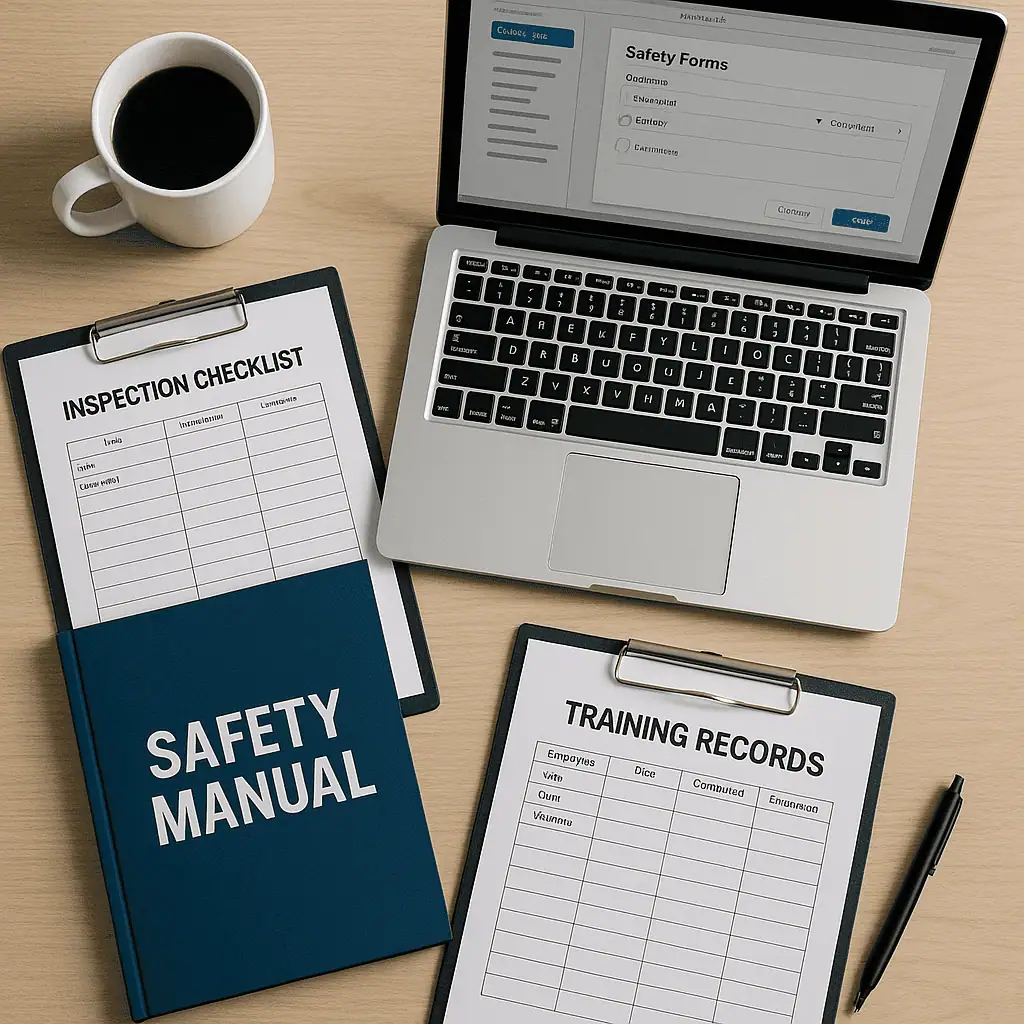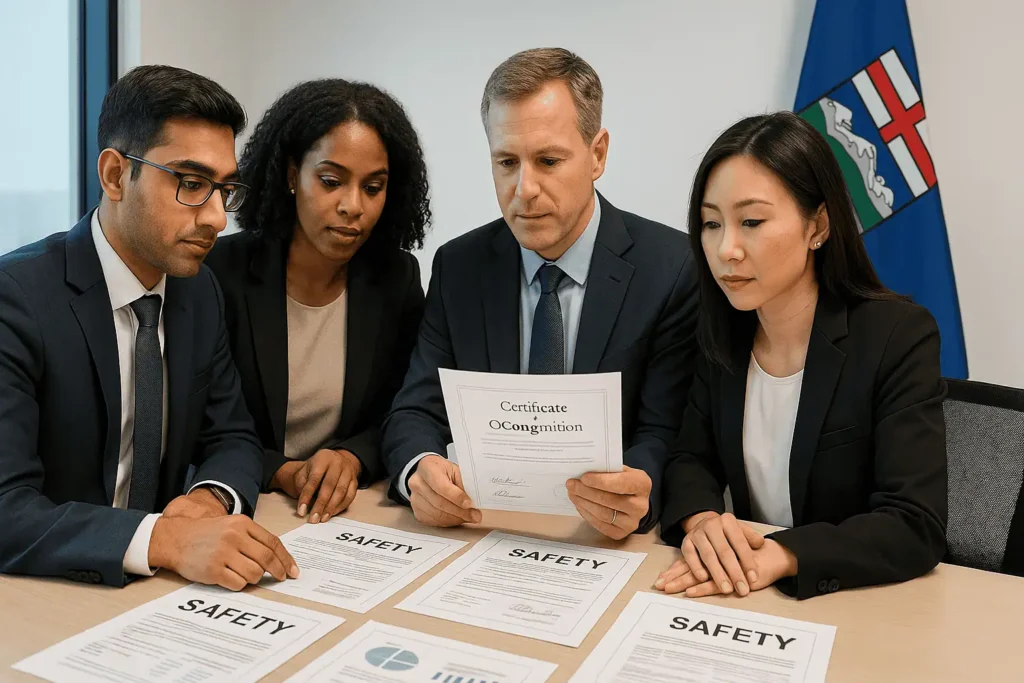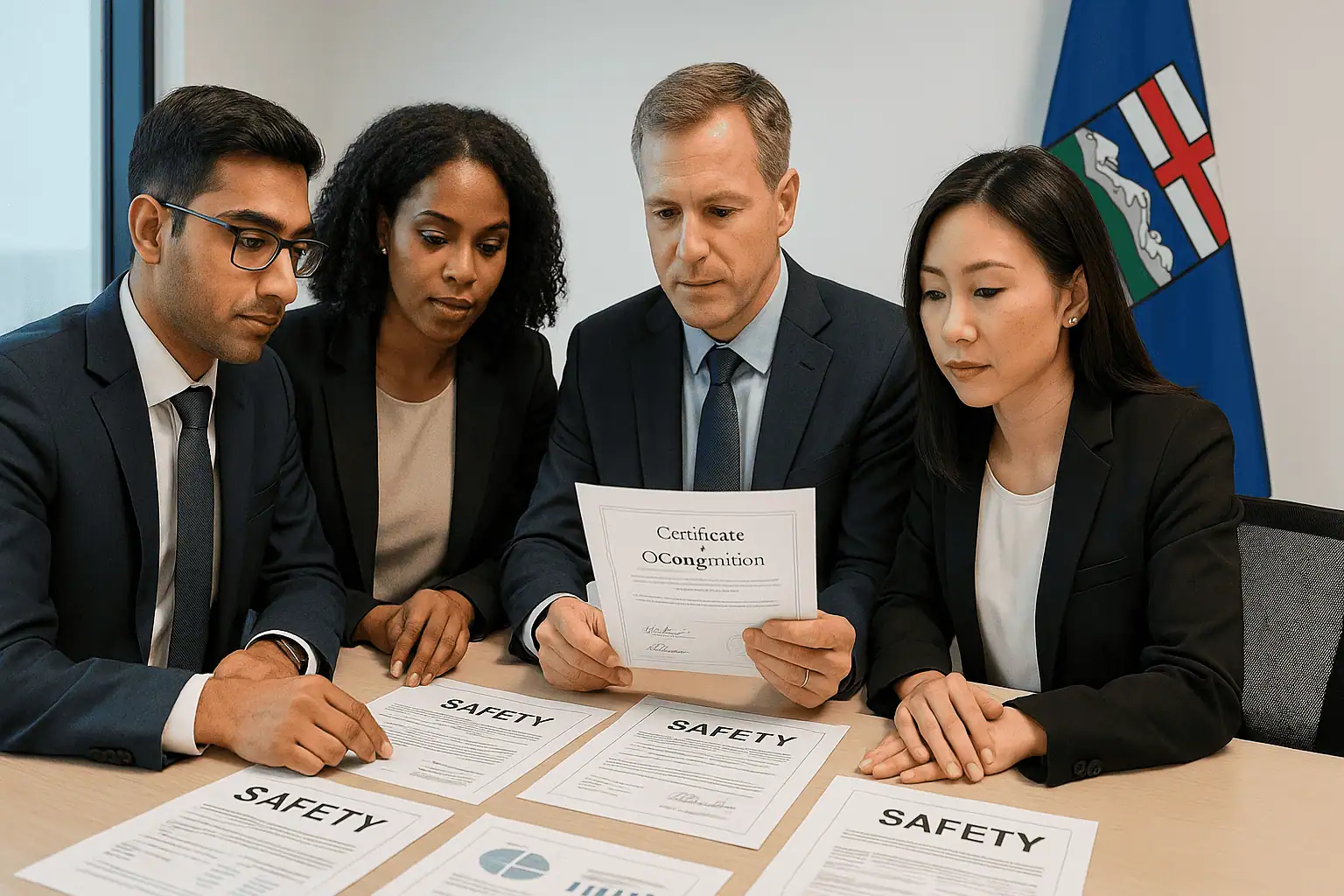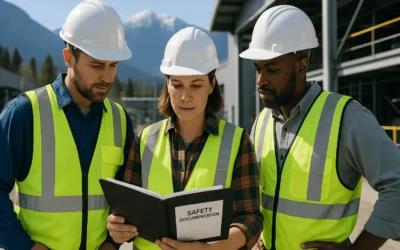If you’re a small business owner in Alberta’s construction or oil and gas industry, you’ve likely heard that COR certification isn’t just a nice-to-have—it’s becoming essential for winning contracts and reducing insurance costs. But navigating the Alberta COR process can feel overwhelming, especially when you’re focused on running your business.
This comprehensive guide breaks down exactly how to get Cor certified in Alberta, covering everything from choosing the right certifying partner to maintaining your certification long-term. Whether you’re pursuing full COR or SECOR certification, we’ll walk you through each step so you can approach this process of how to get Cor certified in Alberta with confidence.
This guide explains in detail how to get Cor certified in Alberta and emphasizes the importance of the certification for Alberta businesses.
What is COR Certification in Alberta?
The Certificate of Recognition (COR) is Alberta’s premier workplace safety certification program, administered through the Partnerships in Injury Reduction (PIR) initiative. When you achieve COR certification Alberta recognizes that your company has developed, implemented, and successfully audited a health and safety management system that meets or exceeds provincial standards.
For Alberta businesses, COR certification delivers three critical benefits:
Financial Incentives: COR-certified companies can earn WCB premium refunds of up to 20%. Many businesses see their first-year rebate cover the entire cost of certification.
Competitive Advantage: Major clients increasingly require COR certification for bidding. Without it, you’re automatically excluded from lucrative contracts with companies like Suncor, Canadian Natural Resources, and most major municipalities.
Improved Safety Culture: The COR process doesn’t just check boxes—it builds systems that genuinely reduce workplace incidents, protecting your most valuable asset: your people.
COR vs. SECOR: Which Path is Right for Your Business?
The Alberta COR process offers two distinct pathways based on your company size:
SECOR (Small Employer Certificate of Recognition) is designed for businesses with 10 or fewer employees. This includes everyone covered under your WCB account—owners, managers, part-time staff, and temporary workers. SECOR uses a simplified self-assessment process that’s more manageable for small operations.
COR (Certificate of Recognition) is for businesses with 11 or more employees. This requires a formal external audit but offers the same financial benefits and market recognition as SECOR.
Understanding how to get Cor certified in Alberta is crucial for small business owners looking to improve safety and competitiveness.
The key difference lies in the audit process. SECOR companies conduct their own internal assessment, while COR companies must hire a certified external auditor. However, both paths lead to the same three-year certification cycle and WCB rebate eligibility.
Let’s dive deeper into how to get Cor certified in Alberta and avoid common pitfalls.
Step-by-Step Guide to Getting COR Certified in Alberta
How to get Cor certified in Alberta: Key Steps
Step 1: Choose Your Certifying Partner
Your first critical decision is selecting a Certifying Partner (CP). These industry-specific safety associations guide you through the entire process, provide training, and conduct quality assurance on your audit.
Alberta authorizes 13 Certifying Partners, each with unique strengths:
- Alberta Construction Safety Association (ACSA) serves the construction industry with the most comprehensive training program
- Energy Safety Canada (ESC) specializes in oil and gas with cross-provincial recognition
- Alberta Association for Safety Partnerships (AASP) offers flexibility for diverse industries
Your choice impacts everything from training requirements to audit tools, so research carefully. Consider your industry fit, training accessibility, and total costs when making this decision.
Step 2: Develop Your Health and Safety Management System
The foundation of COR certification is a comprehensive Health and Safety Management System (HSMS) covering nine core elements:
- Management commitment and written policy
- Hazard identification and analysis
- Hazard control measures
- Worker competency, orientation, and training
- Inspection programs
- Emergency response planning
- Incident reporting and investigation
- Joint Work Site Health and Safety Committee (or Representative)
- Management system administration
This isn’t simply writing a manual—you must implement these systems and generate evidence of their operation for at least three months before your audit.
Step 3: Complete Required Training
Each Certifying Partner has specific training requirements. For example:
ACSA requires four courses for COR certification:
- Principles of Health & Safety Management (PHSM)
- Leadership for Safety Excellence (LSE)
- Alberta OHS Legislation Awareness (LEG)
- Auditor Training Program (ATP)
Energy Safety Canada takes a more flexible approach, focusing on system development rather than mandatory course completion.
Training isn’t just a checkbox—it builds the expertise needed to maintain your certification long-term.
Step 4: Gather Documentation and Evidence

Success in the Alberta COR process hinges on meticulous documentation. You’ll need:
Policy Documents: Signed health and safety policy, organizational charts showing safety responsibilities
The process of how to get Cor certified in Alberta requires careful attention to detail and planning.
Hazard Management: Formal hazard assessments, safe work procedures, field-level hazard assessments (FLHAs)
Training Records: Employee orientation records, training matrices, competency assessments
Operational Evidence: Inspection reports, safety meeting minutes, incident investigations, emergency drill records
Contractor Management: Pre-qualification questionnaires, contractor safety orientations
The “three-month rule” is crucial—most Certifying Partners require at least three months of consistent documentation proving your system is operational.
Step 5: Undergo the Audit Process

For SECOR: You’ll conduct a self-assessment using your Certifying Partner’s audit tool, then submit it for quality assurance review.
For COR: You must hire an external auditor from your CP’s approved list. The audit uses three verification techniques:
- Document review of your safety manual
- Employee interviews at all organizational levels
- Worksite observations to verify practices match procedures
To pass, you need an overall score of 80% with no single element below 50%.
Step 6: Maintain Your Certification
COR certification follows a three-year cycle:
- Year 1: Initial certification audit
- Years 2 & 3: Annual maintenance audits (can be internal)
- Year 4: Full recertification audit
Missing an annual audit results in automatic cancellation, so build these reviews into your operational calendar.
Understanding how to get Cor certified in Alberta can significantly impact your operational efficiency.
Many businesses wonder how to get Cor certified in Alberta to ensure compliance with safety regulations.
Complete List of Alberta COR Certifying Partners

Here’s your complete directory of Alberta’s 13 authorized Certifying Partners:
Alberta Association for Safety Partnerships (AASP)
- Industries: All industries, especially those without dedicated associations
- Website: https://www.aasp.ca/
Alberta Construction Safety Association (ACSA)
- Industries: All construction trades and related industries
- Website: https://www.youracsa.ca/
Alberta Food Processors Association (AFPA)
Ultimately, knowing how to get Cor certified in Alberta will set your business apart in the industry.
- Industries: Bakeries, meat packers, breweries, food services
- Website: https://www.afpa.com/
Alberta Forest Products Association (AFPA)
- Industries: Forest product manufacturers, logging, trucking
- Website: https://albertaforestproducts.ca/
Alberta Motor Transport Association (AMTA)
- Industries: General trucking, specialized trucking, garbage hauling
- Website: https://amta.ca/
Alberta Municipal Health and Safety Association (AMHSA)
- Industries: Cities, towns, villages, counties, municipal districts
- Website: https://www.amhsa.net/
Alberta Safety Council (ASC)
- Industries: All industries (especially those without dedicated associations)
- Website: https://www.safetycouncil.ab.ca/
Continuing Care Safety Association (CCSA)
- Industries: Private and public long-term care facilities
- Website: https://continuingcaresafety.ca/
Energy Safety Canada (ESC)
- Industries: All oil and gas industries
- Website: https://www.energysafetycanada.com/
Manufacturers’ Health & Safety Association (MHSA)
- Industries: All forms of manufacturing and machine shops
- Website: https://www.mhsa.ab.ca/
To effectively understand how to get Cor certified in Alberta, it’s essential to know your options and the process involved.
Each partner offers unique training programs, audit tools, and industry expertise. Visit their websites to explore their specific offerings and determine the best fit for your operation.
Timeline and Costs: What to Expect
Timeline: Plan for 6-12 months from start to certification. This includes:
- 2-4 weeks: Certifying Partner selection and registration
- 2-3 months: Training completion
- 3-6 months: System implementation and documentation gathering
- 1-2 months: Audit process and quality assurance
Costs vary significantly:
- Training: $500-$3,000 depending on your CP and number of employees requiring certification
- External Auditor (COR only): $1,500-$5,000 based on company size and complexity
- Consulting Support (optional): $2,000-$15,000 for full program development
However, first-year WCB rebates often offset these costs entirely, with ongoing premium reductions providing substantial long-term value.
Common Mistakes to Avoid
Choosing the Wrong Certifying Partner: Research thoroughly—switching partners later requires starting over with new training and audit tools.
Inadequate Documentation: The three-month evidence requirement isn’t negotiable. Start documenting immediately after implementing your system.
Training Shortcuts: Some companies rush through required courses. This knowledge is essential for maintaining your certification and actually improving safety performance.
Treating COR as a Paper Exercise: Auditors use three verification techniques specifically to ensure your system is genuinely operational, not just documented.
Missing Maintenance Audits: Failing to complete annual maintenance audits automatically cancels your certification, requiring you to start over.
If you’re serious about safety, learning how to get Cor certified in Alberta is essential.
FAQ Section
Q: How long does COR certification last in Alberta? A: COR certification is valid for three years, provided you complete annual maintenance audits in years two and three.
We will explore how to get Cor certified in Alberta and the various certifying partners involved.
Q: Can I switch Certifying Partners after starting the process? A: Yes, but it’s complicated. You’ll need to notify both partners and may require additional training or even a new audit to align with the new partner’s standards.
Q: What’s the difference between COR and safety certifications required by ISNetworld or ComplyWorks? A: COR is a provincial government certification focused on your overall safety management system. Third-party platforms like ISNetworld have their own requirements, though COR certification strengthens your profile on these platforms.
Q: Do I need COR if I’m already ISO 45001 certified? A: ISO 45001 and COR serve different purposes. COR is specifically required for WCB rebates and many Alberta client contracts, regardless of other certifications you hold.
Q: What happens if I fail the initial audit? A: You can address the deficiencies and request a re-audit. Most Certifying Partners work with you to achieve success rather than simply rejecting your application.
Take the Next Step Toward COR Certification

Getting COR certified in Alberta doesn’t have to be overwhelming. With proper planning, the right Certifying Partner, and systematic implementation, you can navigate this process of how to get Cor certified in Alberta successfully while building a safety program that genuinely protects your workers and strengthens your business.
The key is starting with a clear understanding of the requirements and a realistic timeline. Whether you choose to tackle this internally or work with experienced consultants, the investment in COR certification pays dividends through reduced insurance costs, expanded market access, and improved workplace safety.
Let Calibre Business Solutions handle your safety program development and COR certification process, so you can concentrate on running your business. Our team has guided hundreds of Alberta companies through successful certification, from initial system development to ongoing maintenance. Contact us at 780-832-5158 or blake@calibrebusinesssolutions.ca to discuss how we can streamline your path to COR certification.
Ready to get started? Visit your chosen Certifying Partner’s website today to begin your registration, or reach out to our team for a consultation on the best approach for your specific situation.
Overall, knowing how to get Cor certified in Alberta will provide your business with a significant advantage in the marketplace.
Businesses often ask how to get Cor certified in Alberta to streamline their operations and improve workplace safety.
For anyone wondering how to get Cor certified in Alberta, the process starts by selecting the right Certifying Partner.
If you’re looking for clear directions on how to get Cor certified in Alberta, this guide is your go-to resource.
Knowing how to get Cor certified in Alberta can lead to better safety practices and more business opportunities.
It is essential for business owners to understand how to get Cor certified in Alberta to meet industry standards.
Many companies are now exploring how to get Cor certified in Alberta to enhance their credibility in the market.
For companies to truly benefit, they need to know how to get Cor certified in Alberta and stay compliant with safety regulations.
Understanding how to get Cor certified in Alberta is key to achieving long-term safety and operational goals.
As you learn how to get Cor certified in Alberta, it’s important to keep track of all requirements.
Contact us today to explore how to get Cor certified in Alberta and enhance your business’s safety program.



